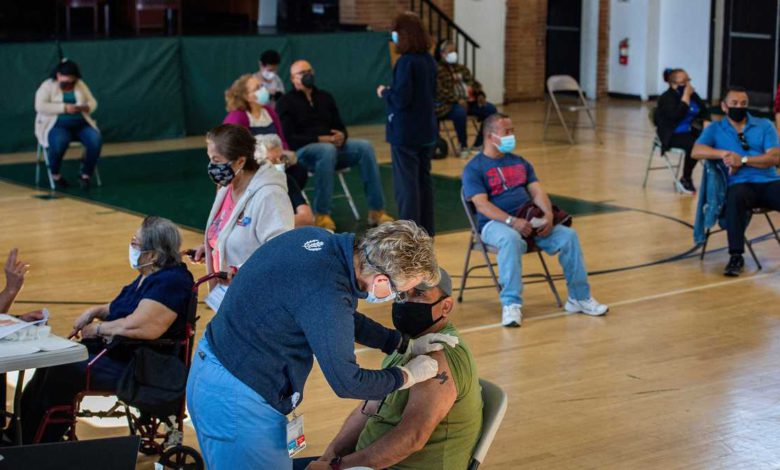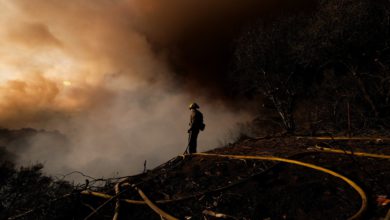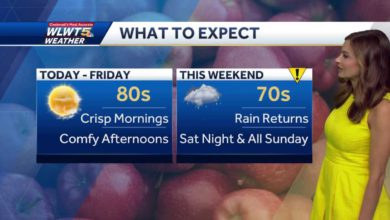

On the road toward a return to normalcy, the rapidly climbing number of COVID-19 vaccinations is good news. But a major challenge may lie ahead, a leading health expert says.Tens of millions of Americans haven't started their vaccinations yet, National Institutes of Health Director Dr. Francis Collins told CNN on Wednesday, and "a lot of those folks are still not sure that they want to take part in this amazing opportunity to put this virus behind us.""We have to really figure out how to get the messages out there so that those who are still undecided get the information they need to see why this is really something they would want to do."A report published this week warned the country will likely reach a "tipping point" in the next two to four weeks and vaccine supply could outstrip demand. Parts of the country have already begun to see that pattern. And younger Americans, many of whom recently became eligible for a shot, are less likely than older residents to claim they have or will get vaccinated, a recent poll found.But experts say the U.S. needs much higher levels of vaccination to control the virus."If we're going to get past this terrible pandemic, it's going to take most of us being immunized. Otherwise, the virus can just keep going on and on," Collins said.So far, roughly 40.5% of the U.S. population has received at least one COVID-19 vaccine dose and about 26.4% is fully vaccinated, according to data from the Centers for Disease Control and Prevention.PGRpdiBjbGFzcz0iaW5mb2dyYW0tZW1iZWQiIGRhdGEtaWQ9ImJhMjIxYWIxLTEwMDQtNGI1Zi05NDAwLThlMzUzOGIzYmRhZCIgZGF0YS10eXBlPSJpbnRlcmFjdGl2ZSIgZGF0YS10aXRsZT0iVW5pdGVkIFN0YXRlcyBDT1ZJRCBWYWNjaW5lIEluZm9ncmFtIj48L2Rpdj48c2NyaXB0PiFmdW5jdGlvbihlLGksbixzKXt2YXIgdD0iSW5mb2dyYW1FbWJlZHMiLGQ9ZS5nZXRFbGVtZW50c0J5VGFnTmFtZSgic2NyaXB0IilbMF07aWYod2luZG93W3RdJiZ3aW5kb3dbdF0uaW5pdGlhbGl6ZWQpd2luZG93W3RdLnByb2Nlc3MmJndpbmRvd1t0XS5wcm9jZXNzKCk7ZWxzZSBpZighZS5nZXRFbGVtZW50QnlJZChuKSl7dmFyIG89ZS5jcmVhdGVFbGVtZW50KCJzY3JpcHQiKTtvLmFzeW5jPTEsby5pZD1uLG8uc3JjPSJodHRwczovL2UuaW5mb2dyYW0uY29tL2pzL2Rpc3QvZW1iZWQtbG9hZGVyLW1pbi5qcyIsZC5wYXJlbnROb2RlLmluc2VydEJlZm9yZShvLGQpfX0oZG9jdW1lbnQsMCwiaW5mb2dyYW0tYXN5bmMiKTs8L3NjcmlwdD4=And efforts — federal, state and local — are ongoing to push up those vaccination numbers."I think our effort shifts, and it shifts to younger people who just don't think about Covid quite as much," Andy Slavitt, the White House senior adviser for COVID-19 response, told CNN.In Maryland, Gov. Larry Hogan announced a new "all-hands-on-deck" effort to ensure every resident who wants a shot can get one as quickly as possible, including seniors and college students."We truly are close to that light at the end of the tunnel. Those of you who have not yet been vaccinated, please go get a vaccine as quickly as you can. Do it for yourself, do it for your family, do it for your friends, and do it so that all of us can put this global pandemic behind us," Hogan said in a statement.Hundreds of Americans die every dayWhile many government leaders are highlighting the proximity to ending the pandemic, COVID-19 numbers in the U.S. are still high.In the past week, a daily average of more than 62,900 COVID-19 infections was reported, according to data from Johns Hopkins University.More than 43,000 Americans are hospitalized with the virus, according to the Department of Health & Human Services.And hundreds of Americans continue to lose their lives every day. In the past week alone, the U.S. reported more than 4,900 COVID-19 deaths.In Washington state, COVID-19 cases are increasing in most counties and hospitalizations are up, with a sharp increase in the number of young adults who are hospitalized, said Dr. Umair Shah, the state's secretary of health.And most counties have also detected variants, Shah said."Good news (is) that two-thirds of people 65+ are fully vaccinated and more than half of people 50+ have had one #COVID19 #Vaccine dose," Shah said on Twitter. "Bad news is that as close as we are to turning the corner, we are beginning to see a 4th wave and need people to hang on a bit longer."Variants also helped fuel a violent surge in Michigan and officials say that the faster the country gets more shots into arms, the more we lower the chances of dangerous strains fueling further spikes.A new study highlights the importance of vaccinationsFor those who have been fully vaccinated, the risk of still getting COVID-19 — described as "breakthrough infections" — remains extremely low, a new study suggests.Among 417 employees at Rockefeller University who were fully vaccinated with either the Pfizer or Moderna vaccines, only two of them had breakthrough infections later, according to the study.The researchers found that variants with several differences from the original virus caused those breakthrough infections."We have characterized bona fide examples of vaccine breakthrough manifesting as clinical symptoms," they wrote."These observations in no way undermine the importance of the urgent efforts being taken at the federal and state levels to vaccinate the U.S. population. They also lend support to efforts to advance a new vaccine booster (as well as a pan-coronavirus vaccine) to provide increased protection against variants." Another study that looked at infections in nursing homes in Chicago found that most fully vaccinated residents were not infected with the virus even after someone in the same facility tested positive.Among the nearly 8,000 residents and nearly 7,000 staff that received two doses since December, there were only 22 breakthrough infections among the fully vaccinated, according to the CDC's Morbidity and Mortality Weekly Report published on Wednesday.Of those breakthrough cases, two-thirds were asymptomatic. Two residents were hospitalized and one of those residents died, the CDC said. The person who died had three underlying conditions, the agency added.
On the road toward a return to normalcy, the rapidly climbing number of COVID-19 vaccinations is good news. But a major challenge may lie ahead, a leading health expert says.
Tens of millions of Americans haven't started their vaccinations yet, National Institutes of Health Director Dr. Francis Collins told CNN on Wednesday, and "a lot of those folks are still not sure that they want to take part in this amazing opportunity to put this virus behind us."
"We have to really figure out how to get the messages out there so that those who are still undecided get the information they need to see why this is really something they would want to do."
A report published this week warned the country will likely reach a "tipping point" in the next two to four weeks and vaccine supply could outstrip demand. Parts of the country have already begun to see that pattern. And younger Americans, many of whom recently became eligible for a shot, are less likely than older residents to claim they have or will get vaccinated, a recent poll found.
But experts say the U.S. needs much higher levels of vaccination to control the virus.
"If we're going to get past this terrible pandemic, it's going to take most of us being immunized. Otherwise, the virus can just keep going on and on," Collins said.
So far, roughly 40.5% of the U.S. population has received at least one COVID-19 vaccine dose and about 26.4% is fully vaccinated, according to data from the Centers for Disease Control and Prevention.
And efforts — federal, state and local — are ongoing to push up those vaccination numbers.
"I think our effort shifts, and it shifts to younger people who just don't think about Covid quite as much," Andy Slavitt, the White House senior adviser for COVID-19 response, told CNN.
In Maryland, Gov. Larry Hogan announced a new "all-hands-on-deck" effort to ensure every resident who wants a shot can get one as quickly as possible, including seniors and college students.
"We truly are close to that light at the end of the tunnel. Those of you who have not yet been vaccinated, please go get a vaccine as quickly as you can. Do it for yourself, do it for your family, do it for your friends, and do it so that all of us can put this global pandemic behind us," Hogan said in a statement.
Hundreds of Americans die every day
While many government leaders are highlighting the proximity to ending the pandemic, COVID-19 numbers in the U.S. are still high.
In the past week, a daily average of more than 62,900 COVID-19 infections was reported, according to data from Johns Hopkins University.
More than 43,000 Americans are hospitalized with the virus, according to the Department of Health & Human Services.
And hundreds of Americans continue to lose their lives every day. In the past week alone, the U.S. reported more than 4,900 COVID-19 deaths.
In Washington state, COVID-19 cases are increasing in most counties and hospitalizations are up, with a sharp increase in the number of young adults who are hospitalized, said Dr. Umair Shah, the state's secretary of health.
And most counties have also detected variants, Shah said.
"Good news (is) that two-thirds of people 65+ are fully vaccinated and more than half of people 50+ have had one #COVID19 #Vaccine dose," Shah said on Twitter. "Bad news is that as close as we are to turning the corner, we are beginning to see a 4th wave and need people to hang on a bit longer."
Variants also helped fuel a violent surge in Michigan and officials say that the faster the country gets more shots into arms, the more we lower the chances of dangerous strains fueling further spikes.
A new study highlights the importance of vaccinations
For those who have been fully vaccinated, the risk of still getting COVID-19 — described as "breakthrough infections" — remains extremely low, a new study suggests.
Among 417 employees at Rockefeller University who were fully vaccinated with either the Pfizer or Moderna vaccines, only two of them had breakthrough infections later, according to the study.
The researchers found that variants with several differences from the original virus caused those breakthrough infections.
"We have characterized bona fide examples of vaccine breakthrough manifesting as clinical symptoms," they wrote."These observations in no way undermine the importance of the urgent efforts being taken at the federal and state levels to vaccinate the U.S. population. They also lend support to efforts to advance a new vaccine booster (as well as a pan-coronavirus vaccine) to provide increased protection against variants."
Another study that looked at infections in nursing homes in Chicago found that most fully vaccinated residents were not infected with the virus even after someone in the same facility tested positive.
Among the nearly 8,000 residents and nearly 7,000 staff that received two doses since December, there were only 22 breakthrough infections among the fully vaccinated, according to the CDC's Morbidity and Mortality Weekly Report published on Wednesday.
Of those breakthrough cases, two-thirds were asymptomatic. Two residents were hospitalized and one of those residents died, the CDC said. The person who died had three underlying conditions, the agency added.







